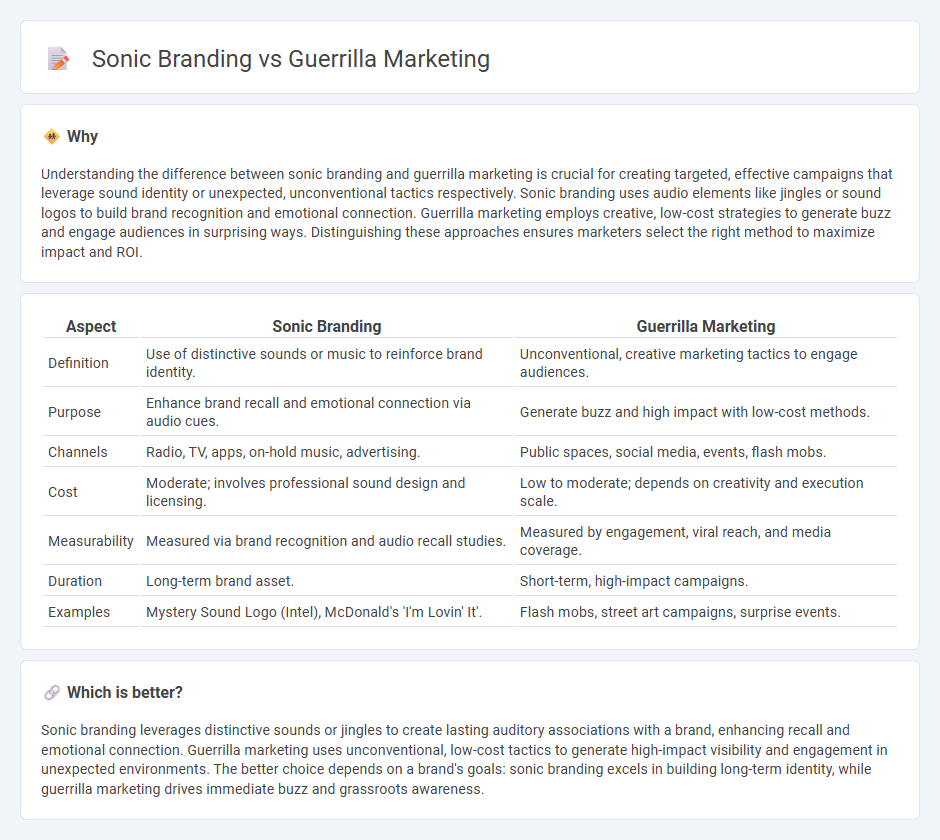
Sonic branding uses distinctive audio elements like jingles and sound logos to create brand recognition and emotional connections, enhancing customer recall and loyalty. Guerrilla marketing employs unconventional, low-cost tactics that surprise and engage audiences in public spaces, generating buzz and viral potential. Explore the differences between these innovative strategies to elevate your marketing approach.
Why it is important
Understanding the difference between sonic branding and guerrilla marketing is crucial for creating targeted, effective campaigns that leverage sound identity or unexpected, unconventional tactics respectively. Sonic branding uses audio elements like jingles or sound logos to build brand recognition and emotional connection. Guerrilla marketing employs creative, low-cost strategies to generate buzz and engage audiences in surprising ways. Distinguishing these approaches ensures marketers select the right method to maximize impact and ROI.
Comparison Table
| Aspect | Sonic Branding | Guerrilla Marketing |
|---|---|---|
| Definition | Use of distinctive sounds or music to reinforce brand identity. | Unconventional, creative marketing tactics to engage audiences. |
| Purpose | Enhance brand recall and emotional connection via audio cues. | Generate buzz and high impact with low-cost methods. |
| Channels | Radio, TV, apps, on-hold music, advertising. | Public spaces, social media, events, flash mobs. |
| Cost | Moderate; involves professional sound design and licensing. | Low to moderate; depends on creativity and execution scale. |
| Measurability | Measured via brand recognition and audio recall studies. | Measured by engagement, viral reach, and media coverage. |
| Duration | Long-term brand asset. | Short-term, high-impact campaigns. |
| Examples | Mystery Sound Logo (Intel), McDonald's 'I'm Lovin' It'. | Flash mobs, street art campaigns, surprise events. |
Which is better?
Sonic branding leverages distinctive sounds or jingles to create lasting auditory associations with a brand, enhancing recall and emotional connection. Guerrilla marketing uses unconventional, low-cost tactics to generate high-impact visibility and engagement in unexpected environments. The better choice depends on a brand's goals: sonic branding excels in building long-term identity, while guerrilla marketing drives immediate buzz and grassroots awareness.
Connection
Sonic branding enhances guerrilla marketing by creating memorable audio cues that amplify the impact of unexpected, unconventional campaigns. Integrating distinctive sound elements in guerrilla tactics increases brand recall and emotional engagement among target audiences. Effective use of sonic branding in guerrilla marketing drives stronger consumer connections and boosts overall campaign performance.
Key Terms
Guerrilla Marketing:
Guerrilla marketing leverages unconventional, low-cost tactics to create memorable and engaging brand experiences in public spaces, often relying on surprise and creativity to capture consumer attention. This strategy is highly effective for small businesses aiming to maximize impact with limited budgets by fostering direct consumer interaction and viral word-of-mouth. Explore comprehensive strategies and successful case studies to fully understand the power of guerrilla marketing.
Ambush
Guerrilla marketing uses ambush tactics to surprise audiences in unconventional spaces, creating memorable, low-cost brand interactions. Sonic branding, while primarily focusing on audio identity, can incorporate ambush elements through unexpected sound cues in public areas, enhancing brand recall. Explore how ambush strategies redefine engagement in both guerrilla marketing and sonic branding for innovative brand experiences.
Viral
Guerrilla marketing leverages unconventional, low-cost tactics to create viral buzz and achieve high audience engagement through surprise and creativity. Sonic branding uses distinctive audio elements like jingles or sound logos to enhance brand recognition and trigger emotional connections that can go viral across digital platforms. Discover more about how combining viral potential in guerrilla marketing and sonic branding can amplify your brand's impact.
Source and External Links
Guerrilla marketing - Guerrilla marketing is an advertisement strategy using surprise and unconventional interactions to promote a product or service, aiming to create memorable consumer experiences and word-of-mouth spread, often with low cost and focus on creativity over big budgets.
What Is Guerrilla Marketing? 4 Types and Examples to ... - Guerrilla marketing uses creative, unexpected tactics in public spaces to delight and attract consumers, emphasizing human interaction and buzz generated via word-of-mouth and social media for wide brand awareness.
Guerrilla Marketing: understand what it is and how to do it - This strategy creatively captures the public's attention, increasing engagement, expanding brand reach on social media, and offering low cost yet high impact marketing compared to traditional advertising.
 dowidth.com
dowidth.com